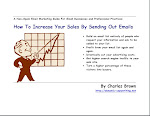I just read an article by Erica Stritch in Rain Today that 69% of buyers who are considering hiring a professional services firm will visit a company's web site before making a decision to do business.
This statistic just adds one more compelling reason to make sure your web site delivers the kind of content that will engage and persuade your visitors.
The days of just slapping up a brochure on the web or filling your site with empty "mission statement" language are over (if they ever exited). Whether you are a professional services firm or not, the point is that you cannot afford to make your web site an afterthought.
How can you make your site engaging and persuasive? Here are a few ideas"
- Pay attention to the search terms people typed into a search engine that led visitors to your site. This is a great clue to tell you what people are looking for and what questions they want answered. Make sure your site delivers this information.
- Build your site around what your visitors want to know, what problems they want to solve or what questions they want answered - rather than what you want to sell. Check out my article You're Really Just Selling Aspirin for more on how to do this.
- Make sure the home page offers visitors clear choices to click based on those questions they want answered or problems they want to solve that I mentioned above. It is fine to have product or services choices for those who have already visited your site or who are ready to buy, but most people want information first.
- Do I have to mention benefits? Of course I do because 90% of web sites I visit are written by people who wouldn't know a benefit if it bit them on the nose. If you have trouble distinguishing between features and benefits, substitute "solutions," "answers" or "changes" for the word "benefit."
- Use your site as a lead generation machine. Give visitors a reason a REASON to give you their email address. Offer something valuable and free (usually some information product words best). Most people will not return to your site unless you contact them later with more of the information they sought in the first place.
- What you say in your meta tags does matter. True it has little impact on getting search engine traffic, but it is also what people see when your site comes up in their search results. This will go a long way toward getting them to click onto your site. BUT it also tells them what to expect when they arrive, so don't le them down.
- Include case studies. The actual success stories of your existing customers will not only give people confidence about doing business with you, it will help them understand what you do and what problems you can solve.
None of us can take for granted the importance of our web sites. When over two-thirds of our potential clients check us out online as part of their decision-making process, no business can afford to gamble with a bad impression.
COPYRIGHT © 2008, Charles Brown


Subscribe to:
Post Comments (Atom)



0 comments:
Post a Comment